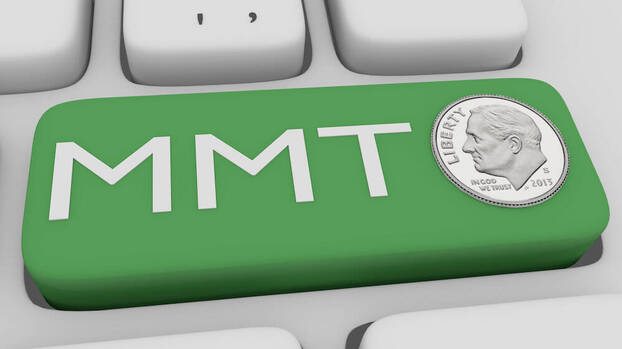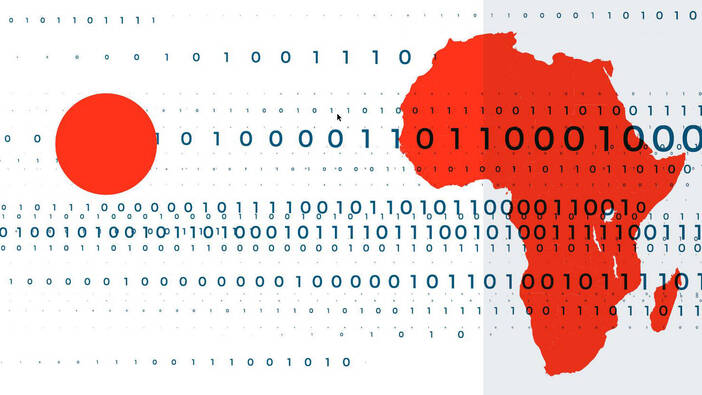
Modern Monetary Theory (MMT), sometimes also called “functional finance” or “chartalism”, is a newer formulation of older Keynesian monetary theory and credit theories of money. While its basic views are shared by many progressive economists, there is some debate on some aspects of it and under which conditions these apply.
Fabio De Masi is a former MEP and MP for Die Linke, where he was vice chair of the parliamentary group and its spokesperson on financial affairs. He is currently a research fellow with the Financial Innovation Hub of the University of Cape Town in South Africa.
MMT basically argues that money is created by state power. Essentially, MMT claims that money became accepted as money when centralized power (states, kingdoms, etc.) forced businesses and private households to pay taxes. Hence, they had to accept state money, because taxes had to be paid in that money. Money essentially is a tax credit. People accept it because it is forced upon them, not because of the material quality of the pieces of paper or coins.
To pay taxes, money must, however, first be brought (or more precisely spent) into existence — as otherwise nobody has money to pay the taxes. Hence, according to MMT, taxes (or even borrowing) do not finance government budgets. To the contrary, the state spends first, and taxes later.
Let us consider a newly created state where nobody has yet paid taxes: workers will be only willing to “voluntarily” build roads or bridges for the state or serve in the police or the army if they receive an accepted form of payment. They need a commonly accepted form of money to buy food or clothes from other people who produce such goods. The state ensures the acceptance of that money by forcing everyone to pay taxes in the national currency. However, to pay taxes in that currency people must first be paid in order to obtain that currency.
In banking terms, the process looks like this: treasury A has an account with the central bank and the state pays — let’s say a construction firm — to build a road, with a bank account at commercial bank B. The central bank will first credit the account of treasury A. It will then delete some numbers from the treasury account A and put it into the account of bank B at the central bank. When the owner of the construction company pays out salaries to workers, into their accounts at bank C, and they purchase food or other items with it, money will have entered the economy. As the central bank is considered a state institution (with a certain level of independence) the money being injected into the economy via spending is, in this first step, created by the state.
The state simply spends money into existence. Or in other words: the state needs people to build roads or hospitals — why should people start working for the state if the state just gives them a worthless piece of paper? However, as the state forces taxation upon them, they must accept the currency and they know everybody else will accept the currency as well (because of taxation), so they start trading in that currency. Hence, money is just a legal convention.
Taxes then do not exist to finance the state but to ensure acceptance of the national currency. Further, taxes are being collected to revoke some of the purchasing power from private households and firms (to prevent the economy from overheating) and/or affect the distribution of income (such as reducing or widening social inequalities).
According to MMT, states can thus never run out of their own money. The central bank is technically seen as a department of the state (despite many central banks enjoying high central bank independence by conscious institutional design). The central bank is only separated from the treasury by institutional design (to signal its independence). Ultimately MMT stipulates that a central bank can never deny their own government the money needed (although central banks can at times wrestle with governments).[1] Central banks are state entities with their specific powers and independence granted to them by state decrees.
It may seem counterintuitive to argue that states can never run out of money in their own currency. Aren’t we used to reading in the papers that states borrow money on the capital market?
States are not limited by the available amount of money but by real resources. This does not mean that they should spend or “print” money endlessly. This might in fact lead to runaway inflation if an economy overheats or it may trigger currency devaluation. Developing countries that import crucial technology which they need to pay for in foreign currency such as US dollars might then need to pay more US dollars or euros for those imports in terms of their own currency (their currency devalues against the US dollar or the euro).
Hence, real resources and technology or even bottlenecks in production can limit states’ monetary sovereignty. MMT, however, argues that monetary sovereignty is high for larger industrialized economies with flexible exchange rates. Politicians should hence worry less about how to find the money to fund their political projects, but rather attempt to solve real-world problems and decide upon the use of limited resources (i.e. whether the state should invest in green energy or build weapons factories).
Nevertheless, some attempts at monetary sovereignty were made even in poorer countries, such as Thomas Sankara starting infrastructure projects in Burkina Faso without development aid. Unfortunately, Burkina Faso later ran into some bottlenecks despite some early successes.
MMT draws a distinction between issuers of money (the central or federal state, of which the central bank is just a department even if it is granted some autonomy) and the users of money, i.e. firms, private households, or the state at the sub-federal level (such as regions, provinces, or municipalities) which cannot issue their own money. Similarly, if states take on debt in a foreign currency such as the US dollar or give up their currency-issuing power to the European Central Bank (ECB), they lose their monetary sovereignty and they become money users.
It may seem counterintuitive to argue that states can never run out of money in their own currency. Aren’t we used to reading in the papers that states borrow money on the capital market? We also know states make us pay taxes.
However, MMT essentially argues that states use taxes to take some of the money out of circulation (otherwise the economy might overheat and inflation kicks in) and affect the distribution of wealth and income. Hence, taxes do matter a lot. They are needed to control which economic agents control resources in an economy and hence command economic or even political power. For instance, if the state and businesses compete for real resources (i.e. in construction) it may lead to higher prices as both will outbid each other for higher payments in wages and materials. Taxation then allows the state to ensure its own core functions are maintained.
The proponents of MMT acknowledge these limitations, but argue that such conflicts are a political choice and not an economic law.
In MMT, government bonds (borrowing on capital markets) are instead issued to provide safe assets and control interest rates. Hence, if we see states issuing bonds it is not because they need to fund their government spending via bonds. Bonds issuance is just the residual between what states spend in the economy and what they tax out of the economy. If the state spends more than it collects in taxes it issues bonds to collect the monetary overhang.
MMT does not dispute that many states have legal provisions requiring them to balance their budgets (such as the German debt brake) or that central banks may not always back up governments if they, for example, disagree with government policies. Take the clash between the British government and the Bank of England on tax cuts, or the bank run in Greece when the ECB no longer accepted Greek government bonds as collateral which banks could borrow against. Those were primarily political decisions by the central bank.
The proponents of MMT acknowledge these limitations. They simply argue that such conflicts are a political choice and not an economic law. Therefore, sovereign states with exchange rate flexibility should not worry too much about how to finance state expenditure. Government debt is just a device to control inflation. If the economy overheats, states should incur less debt.
However, the conditions stipulated by MMT mostly apply to very large and diversified economies with a high degree of self-sufficiency such as the US, Canada, or Japan. Companies in low-income economies often must borrow in foreign currency to import crucial technology from industrialized countries, as US or European exporters want to be paid in US dollars or euros and not, let’s say, the Mozambican metical. The ability of low-income countries to tolerate devaluation of their domestic exchange rate may thus be more limited as this makes imports and debt service more expensive.
Nevertheless, MMT is useful to better understand the difference between monetary and resource constraints and why, for example, dollarizing an economy reduces monetary sovereignty.
[1] A recent example would be the Bank of England (BoE). Yields on UK government bonds went through the roof when the government of Liz Truss announced unfunded tax cuts to wealthy households. However, the BoE then brought the yields down by intervening into markets. However, the BoE made it clear that it didn’t like the policy and could bring the government into troubled water at any time. Usually central banks apply these fiscally hawkish strategies with progressive governments such as Syriza in Greece. For example, the ECB refused to accept Greek bonds as central bank eligible collateral after Syriza refused the original memorandum of the so-called Troika during the euro crisis. Hence, proponents of MMT would see the ECB rather as a “foreign central bank” to Greece.




